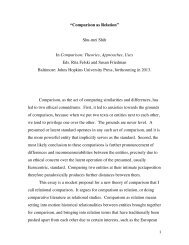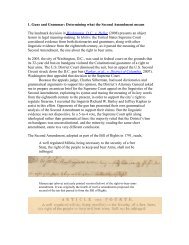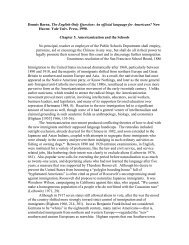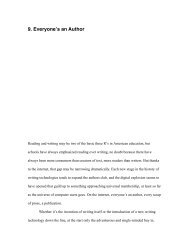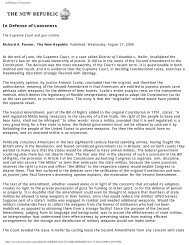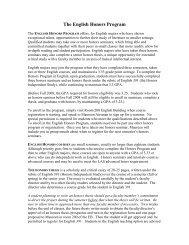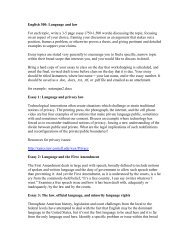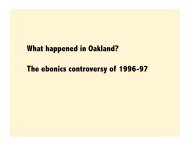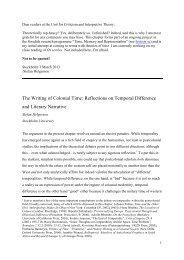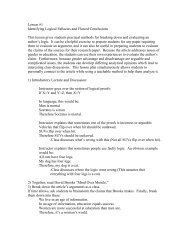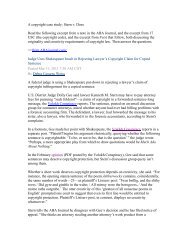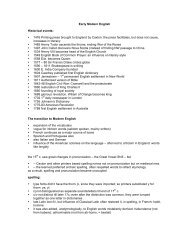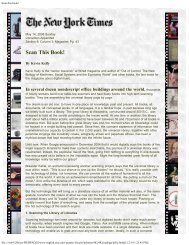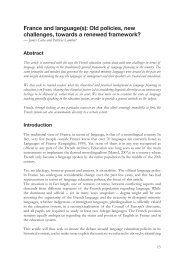Technics of the Subject: The Avatar-Drive Emily Apter - English
Technics of the Subject: The Avatar-Drive Emily Apter - English
Technics of the Subject: The Avatar-Drive Emily Apter - English
You also want an ePaper? Increase the reach of your titles
YUMPU automatically turns print PDFs into web optimized ePapers that Google loves.
Standard Edition by <strong>the</strong> triad "id," "ego," "superego," and that ever since Bruno Bettleheim<br />
scathingly criticized <strong>the</strong> Strachey translation (in his Freud and Man's Soul) <strong>the</strong>re has been heated<br />
interpretive controversy centered on <strong>the</strong>se particular terms. Taking <strong>of</strong>f from Adam Phillips's<br />
thought-provoking observation that "psychoanalysis is about what two people can say to each<br />
o<strong>the</strong>r if <strong>the</strong>y agree not to have sex" (xx), Leo Bersani distills a <strong>the</strong>ory <strong>of</strong> impersonal intimacy<br />
from das Es, going back to <strong>the</strong> book that inspired Freud's <strong>the</strong>ory <strong>of</strong> <strong>the</strong> Id, Georg Groddeck's<br />
1923 <strong>The</strong> Book <strong>of</strong> <strong>the</strong> It [Das Buch vom Es].10 Groddeck had famously affirmed that<br />
man is animated by <strong>the</strong> Unknown, <strong>the</strong>re is in him an "Es," an "It", some wondrous force which<br />
directs both what he himself does, and what happens to him. <strong>The</strong> affirmation "I live" is only<br />
conditionally correct, it expresses only a small and superficial part <strong>of</strong> <strong>the</strong> fundamental principle:<br />
"Man is lived by <strong>the</strong> 'It.'"<br />
(11)<br />
Groddeck's concept <strong>of</strong> "das Es" was itself borrowed from Nietzsche, who used it for "whatever<br />
in our nature is impersonal and subject to natural law" (23). In Beyond Good and Evil Nietzsche<br />
curbed <strong>the</strong> hubristic "I" by making it subject to <strong>the</strong> "itness" <strong>of</strong> thought:<br />
a thought comes when "it" wants to and not when "I" want it, so that it's a falsification <strong>of</strong> <strong>the</strong><br />
fact to say that <strong>the</strong> subject "I" is <strong>the</strong> condition <strong>of</strong> <strong>the</strong> predicate "think." It thinks: but that this "it"<br />
is precisely that old, celebrated "I" is, to put it mildly, only an assumption, an assertion, in no<br />
way an "immediate certainty." After all, we've already done too much with this "it thinks": this<br />
"it" already contains an interpretation <strong>of</strong> <strong>the</strong> event and is not part <strong>of</strong> <strong>the</strong> process itself.<br />
(17)<br />
<strong>The</strong> "itness" <strong>of</strong> "I" underscores <strong>the</strong> element <strong>of</strong> foreignness within <strong>the</strong> subject, a force-field <strong>of</strong><br />
blind energy that serves as thought's predicate. Thinking as "itness," o<strong>the</strong>r to or outside <strong>of</strong> selfconsciousness<br />
becomes key to any <strong>the</strong>ory <strong>of</strong> subject technics.<br />
Something <strong>of</strong> this "itness" informs Lacan's revisionist account <strong>of</strong> <strong>the</strong> Freudian drive. In<br />
"Démontage de la pulsion" ("<strong>The</strong> Deconstruction <strong>of</strong> <strong>the</strong> <strong>Drive</strong>"), a chapter <strong>of</strong> <strong>The</strong> Four<br />
Fundamental Concepts <strong>of</strong> Psycho-analysis, Lacan reinstated <strong>the</strong> distinction between psychical<br />
drive (Trieb) and biological instinct <strong>of</strong>ten blurred in <strong>the</strong> <strong>English</strong> translation <strong>of</strong> Freud. Lacan<br />
maintained that<br />
<strong>Drive</strong> (pulsion) is not thrust (poussée). Trieb is not Drang, if only for <strong>the</strong> following reason. In<br />
an article written in 1915––that is, a year after <strong>the</strong> Einfûrung zum Narzissmus, you will see <strong>the</strong><br />
importance <strong>of</strong> this reminder soon––entitled Trieb und Triebschicksale––one should avoid<br />
translating it by avatar, Triebwandlungen would be avatar, Schicksal is adventure, vicissitude––<br />
in this article, <strong>the</strong>n, Freud says that it is important to distinguish four terms in <strong>the</strong> drive: Drang,<br />
thrust; Quelle, <strong>the</strong> source; Objekt, <strong>the</strong> object; Ziel, <strong>the</strong> aim.<br />
(Lacan 162)<br />
Interestingly for my purposes, in trying to avoid confusing drive with <strong>the</strong> thrust or vicissitudes <strong>of</strong><br />
destiny Lacan clears a conceptual space for translating Triebwandlungen as avatar. Cautioning<br />
against <strong>the</strong> avatar, he none<strong>the</strong>less enters it on <strong>the</strong> oblique into <strong>the</strong> discussion <strong>of</strong> <strong>the</strong> semantics <strong>of</strong><br />
6


